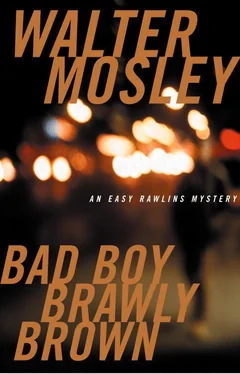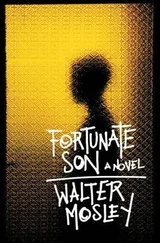Every gate that was meant to be locked was locked. Every can had been emptied of trash. No papers littered the yards, no lights were left on in the classrooms. My staff was a hardworking bunch of people. That was the early sixties, a time when men and women still knew that they had to work hard if they wanted to pay the rent and feed their hungering brood.
The only thing out of place was the metal shop in the shop building complex. All the chairs and even the large metal tables had been pulled out into the hall and stacked as if it were summer and we were preparing to strip and wax the floors.
I stood in the wide hallway wondering what flood or electrical failure might have caused my janitors to resort to this major job.
“Mr. Rawlins.” The voice came from behind me.
I jumped a good yard, wrenching my shoulder as I turned to see my early-morning janitor, Archie “Ace” Muldoon. Short and balding, the little white man nearly glowed in the dark hallway. He had doffed his White Sox baseball cap in deference to his boss — me.
“Ace, you like to scare me to death.”
“Sorry, Mr. Rawlins. I was just comin’ down here to see if Terrance brought down the stripper.”
“Stripper? Who told you to strip these floors?”
“Newgate.” Ace said the name as if it was a whole sentence, a sentence used to explain 90 percent of the problems we had at Truth.
“What’s wrong with him?”
“He came to me and asked where you were,” Ace said. “When I told him that you were sick he nearly turned purple. I tell you, I’ve never seen a man get so apoplectic over the littlest thing.”
“What does me being sick have to do with the metal-shop floor?”
“He told me to take him to all the rooms that were mine to clean. I walked him around the shops ’cause I figured he’d get tired’a lookin’ behind all the heavy machines. I didn’t mean to cause no problem.”
Ace was from poor white farming stock in the Midwest. At one time I’d thought that he was after my job. It took me a while to understand that he respected me as his boss.
“I don’t have a problem, Ace. But what bugged him?”
“He started looking behind the heavy machines and saw where there was a little wax buildup along the edges. I told him that it would take special equipment to move the heavy machinery, but he just kept shaking his head, saying that it wasn’t my fault, that it was the supervisor who was responsible for this filth.” Ace said the last word with real vituperation. I think that he disliked Newgate even more than I did. “Then he told us to prepare the classroom to be stripped and waxed.”
“Don’t worry about it, Ace. When Burns and Peña come in, tell them that I said to help you move this furniture back in the room before classes start.”
“Okay, boss,” Ace said. He went away happy that he was going to frustrate the arrogant principal.
It was just after seven. I knew that Newgate would be stalking the office building, looking for kids smoking cigarettes or making out on some bench. Hiram Newgate loved to catch you doing something wrong. You could be a saint and he’d never notice it, but leave one spot on a leopard-skin coat and he’d be on you in a second.
Rawlins, i want to talk to you,” he called out three seconds after I’d sauntered into the eastern doorway.
He was half the length of the long hall away.
“What about, Hiram?” I called back.
Principal Hiram Newgate didn’t like being addressed as mister. He certainly didn’t like being called by his first name.
The tall and gaunt man strode the distance between us looking as if he were ready to throw down and fight. I smiled and let my eyebrows rise in innocent anticipation.
He wore a dark blue Brooks Brothers suit with a shirt that had the mildest blush of pink under mostly white. His dark tie had a white diamond off center, and his shoes were either new or the perfect example of a high shine.
Principal Newgate was a clotheshorse of the first order, but I can’t fault him for that. I liked the tailor myself. Many a day I came in better dressed than he was. Those days he’d ask me about showing my custodians by example how to hose down the dusty yard or how to till the soil in the garden.
“I’ll do that the day you take over an algebra class,” I’d reply.
That man hated me more than Ace hated him.
“Where’ve you been?” the principal asked.
“Sick.” I didn’t cough but I brought my fingers to my lips as if I might.
“That’s unacceptable.”
“I’ll send my intestines to you next time they feel like keepin’ me in the toilet,” I said.
“In management class,” Principal Newgate said, “the first thing you learn is that an employee who takes his sick days at the beginning or the end of the week is abusing his privilege. That’s what you call a malingerer.”
“Oh?” I said. “And how many Mondays and Fridays have I taken off in the past year?”
“I’m only concerned with yesterday.”
“So is it going to be a rule that nobody can get sick on Mondays and Fridays?”
“Of course not.”
“Well then, how about making it a rule that you can’t take off any more Mondays and Fridays than you can the other days?”
“That’s more what I meant,” the principal said, at sea in my friendly banter.
“I’ll make sure I tell my staff.”
“No one likes a wiseass, Rawlins.”
“Especially when the wiseass gets so mad at his supervisor cursing at him that he makes a formal complaint.”
“I was looking around the shop building with Mr. Muldoon,” Newgate said, changing the subject. “I had him prepare the metal shop for a thorough cleaning.”
“I know,” I said. “I told him to put the furniture back into the classroom so Mr. Sutton can teach his class.”
“I ordered them to remove the furniture.” Newgate reminded me of a Captain Dougherty, who had sent four squads of soldiers into a firefight outside of Anzio, one per hour. Every member of every squad was slaughtered while we made no progress against the enemy. We knew that the good captain had been part of a wager between English and American officers about who would enter the city first. He started sending them at eight a.m. By ten to twelve he was hit with shrapnel from a Yankee grenade that went off by mistake.
“Lucky for you that I’m the officer in charge,” I said. “Because Sutton was in Korea and he wouldn’t like to see his classroom turned all inside out like that.”
“I’m in charge of the whole school,” Newgate said.
“Look it up in your handbook, Hiram,” I said. “Supervising custodian makes the final decisions about plant procedure. You can complain about it, but it will be at maintenance headquarters, not with the administration.”
Newgate had big veins in his neck, thick and cordlike. They stood out when he got really angry. That morning they even hinted red.
Watching him get so irritated gave me a moment of peace. I forgot about Brawly and Conrad, about bushwhackers and the secret arm of the L.A.P.D. Black men in America have always worked for white taskmasters. It had only been in the past few years that I could talk back without fear of losing my job, or maybe even a tooth or two.
Some men I’d known had died challenging their superiors. So Newgate’s aggravation was a kind of balm. It soothed my symptoms, but the disease was still there.
“Hello, Mrs. Plates,” I said later that morning.
Jorge Peña, Garland Burns, Troy Sanders, and Willard Clark had already come in, had coffee, and gone out again. “You’re a few minutes late, aren’t you?” I chided her but I didn’t really care.
Helen Plates was a natural blond Negro, also from the Midwest. She had a complaint for everything from politics to drinking water, from poor blacks to rich whites. She could never get in to work right on time but she was my hardest worker, next to Garland, and Helen never minded if I asked her to do a little overtime. I think she liked to stay late because her husband was an invalid and she worked harder for him than she ever did at Truth.
Читать дальше












